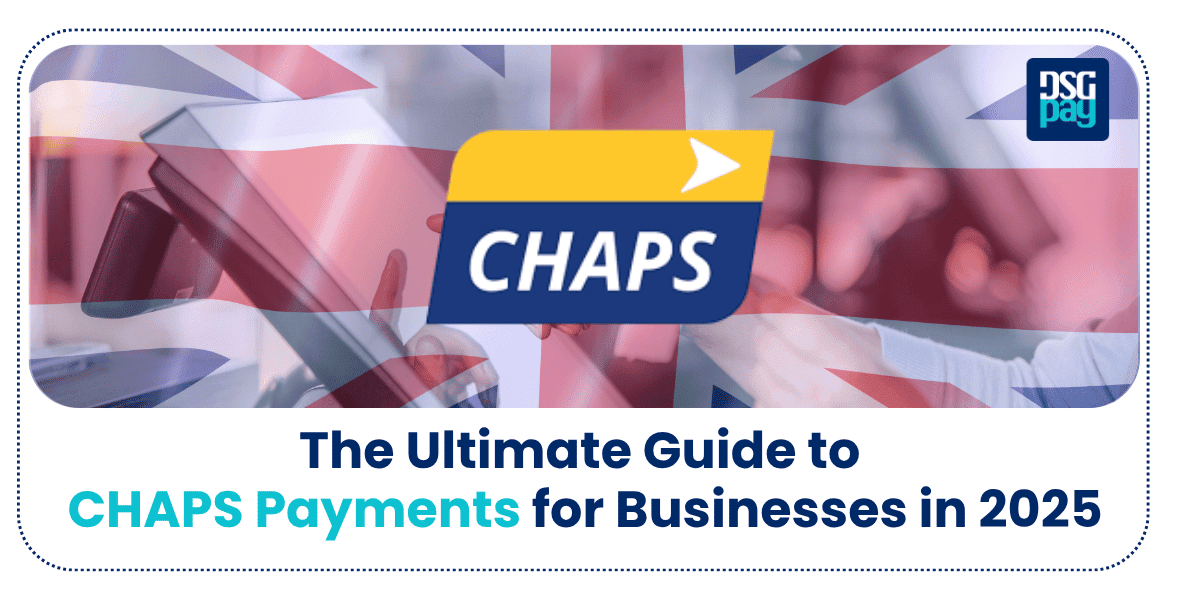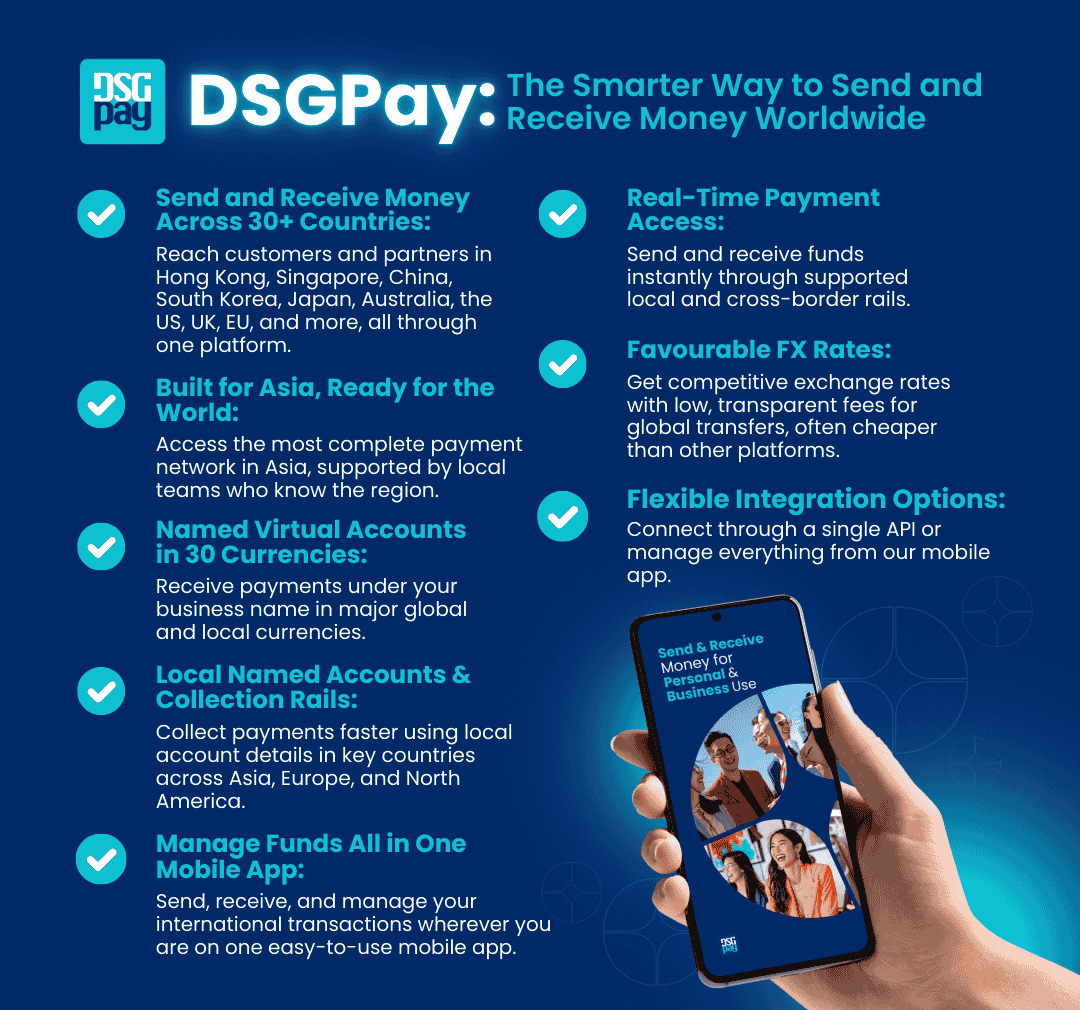Did you know that in 2024, businesses across the UK processed over £87 trillion using CHAPS payments? Plus, this amount accounted for 88% of sterling payments that year.
If you reside in or manage businesses in the UK, you can use CHAPS to process same-day settlement for large transfers. It’s a quick and efficient payment solution.
This guide will show you just how to get started with the best advantage.
Key Takeaways
- CHAPS Payments is the regional clearing payment rail local to the UK. It is designed to handle same-day, irrevocable GBP business payments.
- CHAPS cannot send money abroad directly; international transfers typically rely on SWIFT. However, CHAPS payments can be used as an intermediary processor for transactions within the UK.
- Unlike Faster Payments or BACS, CHAPS has no upper transaction limit. This makes it the go-to option for large commercial transactions that cannot risk delays.
- For everyday business payments, Faster Payments or other local rails could be cheaper. But CHAPS payments remain the best option for guaranteed, same-day, high-value GBP settlements.
What Are CHAPS Payments?
Established in 1984, the Clearing House Automated Payment System (CHAPS) is the UK’s real-time gross settlement (RTGS) system.
It is operated by the Bank of England and was designed to settle same-day, high-value transactions between UK banks and their eligible participants.
Primarily, CHAPS serves corporates, financial institutions, and businesses, helping them clear funds within the day’s business hours.
How Do CHAPS Payments Work?
If you initiate a CHAPS payment, the process usually goes like this:
- The payer submits payment instructions via their bank or a payment service provider (PSP). The instructions include the beneficiary’s account details, the amount in GBP, and any reference information.
- The payer’s bank sends the payment into the CHAPS system. This is where the payment or settlement is made on a gross, real-time basis; that is, no netting.
- The recipient’s bank receives and credits the beneficiary’s account. This usually happens on the same day, provided the instruction is received before the bank’s transaction cut-off time.
- Both banks report to the initiating business, and the recipient receives confirmation and reconciliation data.
Because CHAPS is designed for high-value transfers, banks participating in the scheme are required to hold accounts at the Bank of England and meet specific operational standards. This ensures speed and finality for transactions.
Fees, Speed, and Transaction Limits of CHAPS Payments
For Fees: A typical CHAPS transaction costs approximately £20–£35 through many UK banks. Although the actual fees may vary by banker.
In Speed: Transactions are settled in real time (gross) and credited on the same working day. As long as the instruction for the transaction is sent before the bank’s cutoff (often around 16:00–17:00 GMT).
Transaction Limits: While there is technically no upper limit, CHAPS is designed for high-value transactions (often above £10,000).
Requirements or Eligibility to Use CHAPS Payments
Any UK business with accounts at a participating CHAPS bank can use the system. It’s very simple to use.
The firm or business needs to provide all the appropriate identification and recipient information to the bank.
Then the bank performs regulatory and compliance checks on the business to ensure it meets the standard. Some of these standards include anti-money laundering checks and transaction monitoring checks.
Once the bank confirms that all compliance requirements are met, under the current standards, your business becomes eligible to use CHAPS Payments.
Benefits and Limitations of CHAPS Payments
Benefits of Using CHAPS Payments
For various strategic advantages, businesses rely on CHAPS for
- Speed and Certainty: Funds are guaranteed to be transferred in real time on the same business day. This makes it ideal for urgent and high-value transactions.
- Risk Management: CHAPS Payments are irreversible once settled. This adds another layer of security to transaction tracking for both the payer and the recipient.
- Versatility: CHAPS Payments are best used during property transactions, tax settlements, large supplier invoices, business acquisitions, financial market settlements, etc.
- Traceability: Every transaction is systematically recorded. This makes reconciliation easier and helps during times of audits.
Limitations of CHAPS Payments
The basic limitations to CHAPS payments include:
- Cost and Eligibility: Because of the high cost and eligibility requirements, CHAPS may not be efficient for low-value, frequent payments.
- Lack of Easy Cancellation: When using CHAPS, once a payment has been processed, transaction reversal is not an option.
- Strict Processing Hours: Once an instruction is received after the bank’s cut-off, the payment can only be settled during the next working day. This effectively reduces the speed advantage.
Besides these limitations, CHAPS is an unlimited tool for an organisation’s use, provided they meet all qualifications to use the CHAPS payments method.
CHAPS vs Other UK Payment Methods
To put things in perspective, let’s find out where CHAPS stands against other available UK payment rails.
We will compare various factors of CHAPS payments with those of other known systems like Faster Payments, BACS, and SEPA to see which is better.
| Feature | CHAPS | Faster Payments | BACS | SEPA |
|---|---|---|---|---|
| Speed | Same day (if before cut-off) | Instant for GBP | 2–3 business days | Instant for EUR |
| Cost | £20–£35 per payment | Usually free for businesses | Low / flat monthly fee | Varies by bank |
| Limit | Must be more than £10,000, no upper limit | Up to ~£1 million (bank-defined) | Batch payments, often <£10,000 each | €100 k or bank-defined |
| Best For | High-value, time-sensitive transfers | Everyday business payments | Payroll or invoice settlements | Eurozone cross-border transfers |
Each of the above payment methods has strengths and weaknesses that make it a better choice depending on the use case.
With CHAPS, businesses that handle substantial funds can make a single large payment, with a slightly higher transfer fee. Meanwhile, on other payment rails, the transfer volume would be split into multiple transfers, based on the maximum limit they can carry. Additionally, a transaction fee applies to each batch transfer.
For regular everyday payments, frequent smaller transfers, or euro payments, other networks may offer better cost efficiency. But when making large transfers, using CHAPS would be more cost-efficient.
Tips on How to Use CHAPS Payments Efficiently
Here are some best practices you can keep in mind to optimise the payment process when using CHAPS.
- Schedule Payments Early: Submit instructions as early as possible to ensure settlement happens on the same day.
- Check Beneficiary Details: Even in CHAPS, mistakes in account details can happen, which can cause delays or misplaced transactions.
- Use CHAPS Selectively: CHAPS charges a lot, so reserve it for high-value payments that other cheaper networks can’t handle. Less critical payments can use cheaper alternatives.
- Integrate CHAPS into Your Treasury Systems: Automate payment initiation and reconciliation via ERP or payment platforms to reduce manual errors and costs.
- Leverage Bank APIs and Transparency: Work with banks that provide detailed payment tracking and investigation support.
- Perform Compliance Checks: Set aside time for compliance checks, especially when you have new recipients to pay. A risky or flagged recipient can result in you losing eligibility with CHAPS.
- Have Contingency Buffers: In the event of bank outages, having backup plans to make major transactions is a smart idea.

Can CHAPS Work With a Foreign Account?
The answer to this question depends on the foreign account.
A foreign sender can pay a recipient in the UK through CHAPS payments only if the account they are sending from is held at a branch of an international UK bank and the payment is made in British pounds.
That means CHAPS payments are a domestic rail system that only operates within the UK’s banking network.
As a foreign business, having a fintech multi-currency account that can route payments through an approved CHAPS participating bank would be an easy fix to use the CHAPS payments network.
FAQs about CHAPS Payments
Can CHAPS be used for international payments?
Not directly. CHAPS is designed for GBP payments within the UK only. However, foreigners can leverage CHAPS through fintech platforms that offer multicurrency accounts to make GBP payments into local UK accounts.
How long do international CHAPS take?
An international payment that uses CHAPS as part of the chain will typically take 1-2 business days (depending on time zones, intermediary banks, and currency conversion times).
Do CHAPS payments clear immediately?
All CHAPS payments are same-day settlements. As long as the payment instruction is made before the bank’s cut-off time, around 15:00 – 17:00 GMT. Payments made after the cut-off time are usually processed the next working day.
What is the disadvantage of CHAPS payments?
The main drawbacks of CHAPS payments are higher transaction fees (around £20-£35 per payment), irreversible transactions, UK limited, and strict cut-off times.
Is CHAPS the same as SWIFT?
No, it is not. CHAPS is a regional clearing rail that operates only within the UK. Meanwhile, SWIFT is an international rail network that connects multiple countries.
Final Thoughts
In essence, CHAPS payments are a great choice for UK businesses with high transaction volumes and time-critical payment needs.
Since it has no upper transaction limit and offers same-day settlements, alongside robust security, CHAPS has set a standard most businesses can rely on today.
How Modern Businesses Can Manage GBP Payments with DSGPay
For global businesses that require high-value payments made to a UK-based supplier or for other purposes, DGSPay offers a modern, cost-effective alternative.
By utilising a DSGPay virtual account, businesses can manage GBP payments more efficiently through the following capabilities:
- Named UK Virtual Account: Create a virtual UK business account that carries your brand’s unique tags or name. This helps clients easily trust the account they are paying into or receiving money from.
- Collect GBP like a Local Business: Receive payments into a virtual account that functions like a UK local account.
- Hold and Manage GBP Alongside 30+ Currencies: A single dashboard to hold, send, and receive funds globally.
- Favourable FX Spreads: Convert between GBP and other currencies at competitive rates to optimise international payment costs.
- Simplify Reconciliation: Automated statements and detailed transaction logs support easier audit and matching processes.
- Developer-Friendly API: Connect seamlessly with payment portals and bursary tools to automate billing and payments using the platform’s single-faced API.




